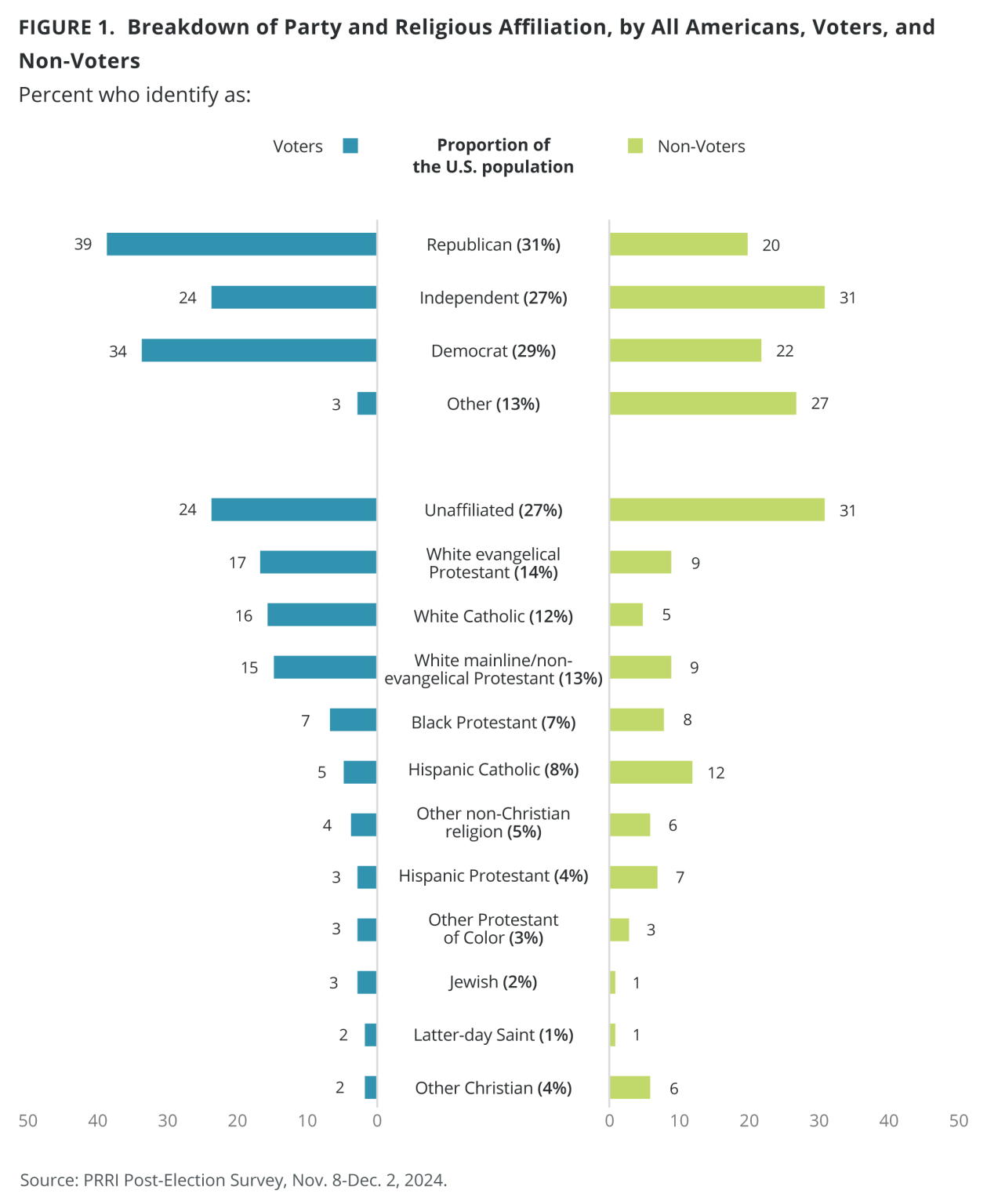

How about you actually put some product like wax or gel in your hair so you can style it properly?


How about you actually put some product like wax or gel in your hair so you can style it properly?


I mean, non-voters aren’t much more progressive really. They’re more likely to be independents (in the US at least). See:

They do skew a bit more D, but not massively so. They’re also largely non-white, less well educated and poorer. It’s a bit of a toss-up whether any of those demographics skew R or D.
I don’t really see much evidence that they’re more progressive, more centrist at best really. Although I suppose if you flatten political beliefs on a 1-dimensional axis, that does mean more progressive on average.
Do note that this differs per state, and voter turnout is also correlated with general results skewing harder in a certain direction. Complexities all around!


Most non-voters don’t hold significantly different beliefs than the voting population. In non-competitive states, it means motivating them to vote is unlikely to tip the scales. Why bother tipping the results from 60% to 55% by spending millions on it? Better to allocate those funds to a 53% to 48% potential flip.
In battleground states they do try to reach these people.


It happened six times: https://en.m.wikipedia.org/wiki/Category:Non-cardinals_elected_pope
Pope Urban VI was the last to have been elected without having been a cardinal, in 1378.
Crossherd #45
🟩🟩🟩⬛️⬛️
🟩🟩🟩🟩🟩
🟩🟩🟩🟩🟩
🟩🟩🟩🟩🟩
⬛️🟩🟩🟩🟩
Time: 0:17
🐐crossherd.clevergoat.com 🐐
Ez-pz. Mistapped on my phone on the last one or it could’ve been faster.


Not sure that says all that much, each service caters to different audiences anyway.


Actually any Catholic man could be Pope, but the cardinals usually pick one of their own.


He’s significantly less Nazi when he’s on his meds, so it’s likely.
Could well be European. EU Windows installs are significantly less bloaty than shit than US installs are.
Well they did meet actually.
This specifically talks about AI data scrapers being an issue, and some general issues that are frankly not exclusive to open access info.
Exploitative companies are always a problem, whether it’s AI or not. But someone who uses the Wikipedia text torrents as a dataset isn’t doing anything of what is described in that article for example.


Except Windows does cater to it, and despite Linux’ supposed superiority it is still by far the dominant desktop OS.


That keeps out 90% of the population. Do not underestimate how complex that is to people who aren’t tech-savvy and who are used to “it just works”.


What makes you say that? Clearly food prices aren’t at the point of unaffordability now. UBI also wouldn’t really create new customers, as people already need food now, UBI just guarantees they won’t have to go into debt to afford it.
What you’re describing makes more sense in an economic context where food is scarce, eg once a retailer has enough customers, they could sell all of their stock. In this scenario, jacking prices makes more sense, because you’re not getting any more customers by lowering them. But food generally isn’t scarce (in the developed world at least), meaning you’re always going to have excess stock. Now, the way to earn more money is to find a delicate balance between lowering prices and gaining more customers (but less revenue per sale, but have more sales and less waste to handle) or increasing prices but losing customers (meaning fewer sales, but more revenue per sale).
UBI isn’t really a factor in that last calculation, because it’s mostly dependent on the prices of your competitors. Of course, in a monopolistic market things are different, but then the price jacking can also happen independently of UBI.
To show a real-life example, take a look at Belgium. The price of food there has been quite low relative to other countries. Why? Because Ahold-Delhaize entered the market and tried competing heavily with existing brands there. The way to do that was through lowering prices, which forced other supermarkets to follow suit. Ahold could afford this, because they own a very significant market share in the Netherlands, where they could in fact increase prices (which is the semi-monopolistic behaviour I mentioned) and offset the cost. Their competitors are less well established or cannot compete at scale, so customers have fewer alternatives (and in locations where they do the prices are lowered a bit again to retain customers).
How does a model that is trained on an open dataset undermine free access? The dataset is still accessible no?
Using open datasets means using data people have made available publicly, for free, for any purpose. So using an AI based on that seems considerably more ethical.


But then surely UBI doesn’t matter if you believe they’ll jack up prices regardless of a good cause?


Because ultimately people don’t have much more to spend. Any competitor of yours that doesn’t jack up prices will win a lot of customers that way. You don’t want to price yourself out of the market.
Ultimately the same amount of money is in the economy, it’s just distributed differently.


It’s not really “way more”. They’re still only going to spend what they wanted to spend before.
The money also isn’t created out of thin air, it’s obtained through taxes on higher incomes and businesses.
And who put them there?